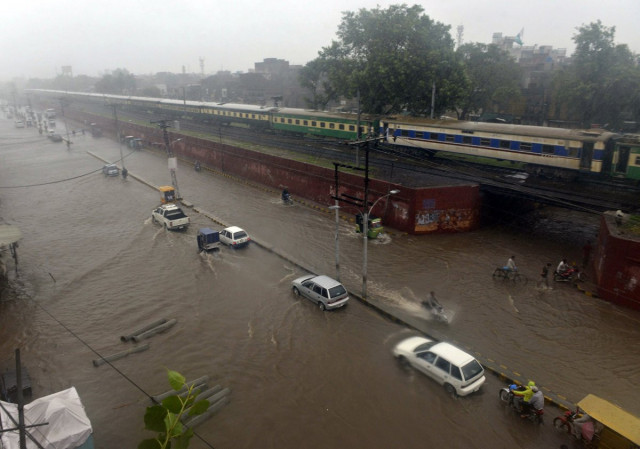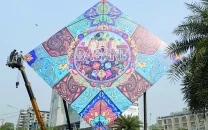Punjab under water
What use is a Metro bus system if the roads beneath it and the feeder roads are flooded and impassable?

Lahore has been particularly badly hit, with the Metro bus services being suspended because the roads are flooded. It is reported that the majority of underpasses in the city are flooded and the canal is bursting at the seams. Beneath this there lies a story — and it is one of failure yet again on the part of the city and provincial administration. In the recent past the city Water and Sanitation Agency (Wasa) and the Lahore Development Authority have written in detail to the office of the chief executive of the province requesting funding for the rehabilitation and expansion of the city sanitation system as well as upgrading the underground drainage system. But to no avail, and schemes such as the Metro bus project — which was completed in just 11 months — were pushed ahead at the expense of properly maintaining the essential water and waste management infrastructure, which is not as attractive vote-wise as is the Metro bus system.
A high-level team was sent to Istanbul last year to see what lessons could be learned from the Istanbul water and sanitation system. Experts from Turkey reciprocated and came to Lahore. Wasa sent detailed maps, data and drawings to its Turkish counterparts making suggestions as to how to improve the system. A range of recommendations emerged from this consultative process which included the construction of new nullahs, the separation of sewage and rainwater run-off and the installation of water treatment plants to convert the waste into water suitable for irrigation. It was also recommended that there be a campaign to raise public awareness as to the best way to dispose of waste and rubbish.
Little has come of considerable effort. Few if any of the recommendations have been taken up let alone acted upon. The government has prepared a Rs9.2 billion plan for the rehabilitation of the Lahore city drainage system in its entirety, but there appears to have been no move to implement the plan in whole or part. The government has also established the Lahore Water and Sanitation Company, but it is dormant.
The situation in Lahore is probably mirrored to a greater or lesser degree in cities across the country, where the neglect of infrastructure and investment in prestige projects such as motorways, flyovers and underpasses and Metro bus systems, are in direct competition for scarce resources. What use is a Metro bus system if the roads beneath it and the feeder roads are flooded and impassable? For flood-hit rural areas there is little remedy beyond appealing to people to build safer houses — but if you are poor you build what you can afford and if that is mud-and-straw then so be it. More will die and lose their livelihoods before the end of the 2014 monsoon, most needlessly, and ‘building back better’ is not an option for most.
Published in The Express Tribune, September 6th, 2014.
Like Opinion & Editorial on Facebook, follow @ETOpEd on Twitter to receive all updates on all our daily pieces.



















COMMENTS
Comments are moderated and generally will be posted if they are on-topic and not abusive.
For more information, please see our Comments FAQ